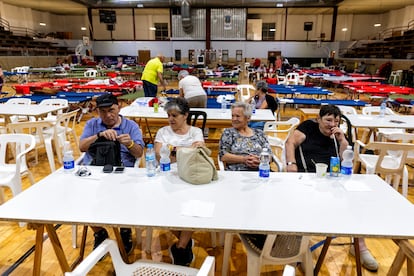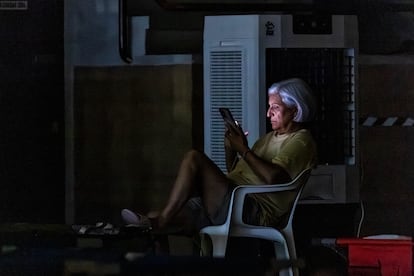Three days sleeping in a evacuation center: "I'm afraid I'll find everything down when I get home."

The lights are about to go out at the La Bañeza sports center at 11:30 p.m. this Wednesday. Some of the evacuees sitting outside—"in the fresh air," as they often do in the summer in their town—enter the playing field to occupy their hammocks. "Who could we ask for a couple of blankets?" asks Genaro Martínez, 75, to one of the Red Cross workers, sitting at the table welcoming those rescued from the fire. They are asked for identification and if they require medication or any special needs. A resident of Quintana and Congosto, where a volunteer lost his life fighting the fire , Martínez is one of the 200 evacuees from towns in the area, about 60 kilometers southwest of the city of León, who still cannot return home.
One of the worst weeks of fires between León and Zamora coincides with the week of celebrations for the Assumption and San Roque in La Bañeza. Clubs had planned to head to the sports center this Wednesday as part of the festivities. However, since Monday, the events have been canceled due to the devastating consequences of the fire . And the sports center in the municipality of 10,581 inhabitants, "practically a city" in the empty Spain, has been converted into a large shelter. It was chosen by the Regional Government of Castile and León as a "safe" and "close" location to the affected towns. It has a capacity for 300 overnight stays, although in recent days it has assisted 1,000 people, with food or medicine. Some people choose to sleep in their cars, nearby, or with relatives.
The playing field at the La Bañeza sports facility has been divided into three areas: the first, where food is being distributed; a second, with long tables and plastic chairs for lunch or just hanging out; and the third, where hammocks have been set up for the night. Some people have been sleeping, or rather trying to, for three days on the makeshift beds provided by the emergency services, after having fled their homes threatened by the flames .
“My fear is finding everything in ruins when I get home,” laments Valentina Vidales, who also has three-quarters of a century under her belt, during which time she has never had to be evicted from her home in Palacios de Jamuz. Ready for sleep, she's lying on her back, clutching her handbag over her stomach and her son in the bouncer on her side. She barely slept an hour the day before due to anxiety—and the snoring, she jokes with amusement, the initial shock now dissipating—and has spent the day practically “doing nothing.” She hasn't showered yet. She'll do so the next day in one of the locker rooms.

Both Martínez and Vidales assure that the staff members' treatment "is very good," and that they have everything they need or ask for on hand. At the facilities, Red Cross workers mingle with local police officers and Civil Protection personnel. Behind the counter where the food is distributed, there are boxes of apples, oranges, grapefruits, bottles of water, and soft drinks. "Our main objective is to meet the basic needs of everyone who comes," explains Ángel García, regional head of the Red Cross in Castilla y León. Breakfast is at 7:30 a.m., lunch at 1:30 p.m., and dinner at 8:30 p.m., with the catering provided by the City Council. Tonight, the menu is a potato omelet sandwich without onions, because one of the evacuees is allergic to onions. "This way, we avoid the debate about whether an omelet should be with or without onions," García jokes, emphasizing the psychosocial support efforts. "We have to tell them very clearly what's going to happen, the phases they'll go through," he adds. Because, like Vidales, the evacuees' biggest concern is what they'll find when they return home.
At the gatehouse, the officers have set up a "charging station" for cell phones and other electronic devices. In the residents' WhatsApp group, 55-year-old Marta Mancheño receives photos and videos of the aftermath of her village, Pobladura de Yuso. Her father's warehouse was destroyed, but her house was not affected. She, her husband, and their two daughters, an 18-year-old, and a 14-year-old son, live in Sant Boi de Llobregat (Barcelona), but are spending the month of August in her parents' village.
On Sunday, they arrived in Pobladura de Yuso, and on Monday, with their "suitcases still unpacked," this family had to leave along with the rest of the town. Now the sports center is a replica of their village, with residents strolling or playing cards, killing time while they wait for the official order to return home. "The first day we slept very little; we were freaking out. The second day we slept a little, and yesterday we were a little scared; the news we were receiving wasn't good," says Mancheño. A couple of people were treated for anxiety attacks. Their children, however, are calm. They spend their time "talking" with other young people, "playing basketball," and "drinking must" in the bars of La Bañeza, where they don't know if the festivities will resume at the end of the week.

EL PAÍS





